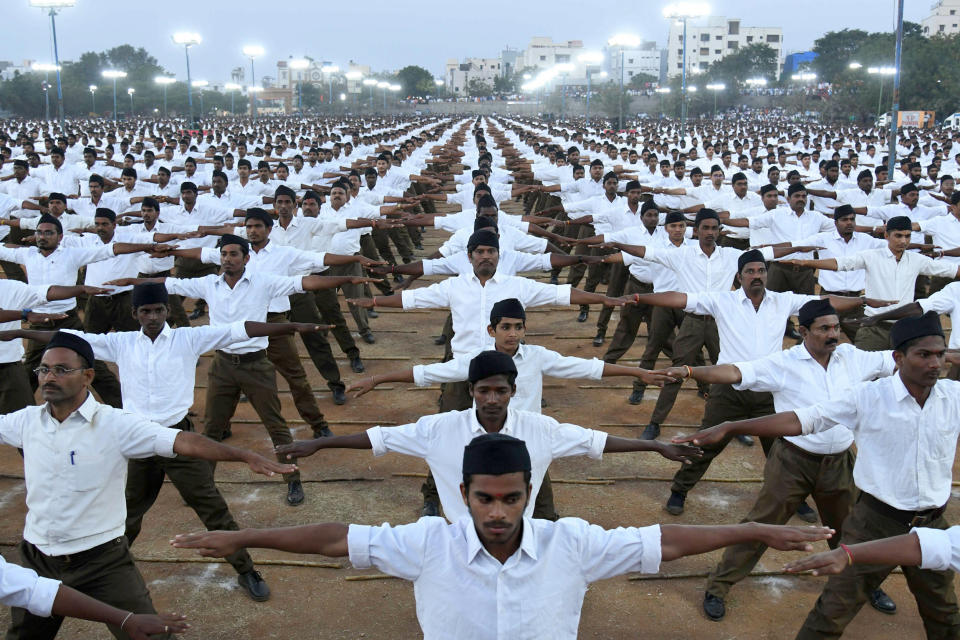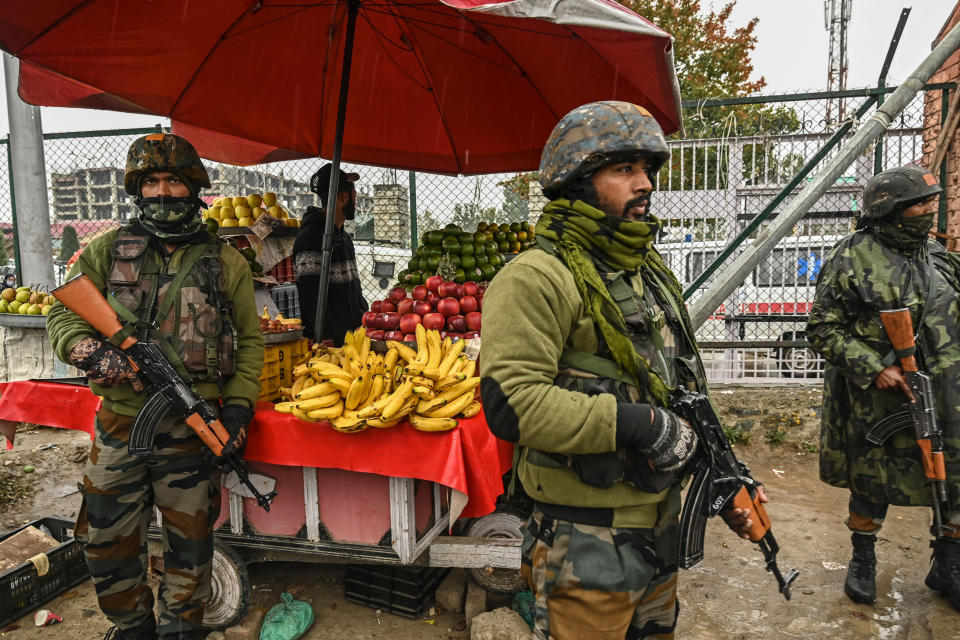India has an eroding image of tolerance in the West. A recent cricket loss proves why.
When India meets its archrival Pakistan on the cricket field, even those who do not follow the sport sit up and watch. But at the opening match of the T20 World Cup late last month, they were in for a rare disappointment when the Pakistan team beat India for the first time in almost 30 years — and by a lot.
In the aftermath of the crushing defeat, ethno-religious tensions boiled over in India, a Hindu-majority country that neighbors Muslim-majority Pakistan. Cricket fans hurled online abuse at Mohammed Shami, the Indian team’s only Muslim player, unfairly blaming him for the loss.
In the state of Uttar Pradesh, three students from Kashmir, a Muslim-majority territory claimed by both India and Pakistan, who celebrated the win on social media were suspended from their college, arrested and charged with sedition.
More than a dozen other Kashmiri students who cheered for Pakistan were assaulted on the night of the match at two universities in the state of Punjab, said Nasir Khuehami, the national spokesperson for the Jammu and Kashmir Student Association.
“This is not new,” Khuehami told NBC News. “Whenever politics is mixed with sports, these incidents happen.”

Tensions between India’s Hindus, who make up about 80 percent of the country’s 1.4 billion people, and Muslims, who make up 14 percent, go back hundreds of years and worsened during British colonial rule.
But under Prime Minister Narendra Modi, a Hindu nationalist who took office in 2014, experts say there has been a sharp rise in discrimination and violence against Muslims that is polarizing society and undermining India’s reputation for religious tolerance.
“India had a very good image internationally, as the world’s largest democracy and the country of tolerance,” said Christophe Jaffrelot, the author of the 2021 book “Modi’s India: Hindu Nationalism and the Rise of Ethnic Democracy.”
“Now gradually this image is getting eroded in the U.S. and Europe.”
This poses a challenge to the United States, which is strengthening its relationship with India as it seeks to counterbalance China. In September, President Joe Biden hosted the prime ministers of India, Australia and Japan at the first in-person meeting of the Quad, a strategic grouping of the four nations.
U.S. lawmakers have expressed concern over the rights of India’s Muslims and other religious minorities, and legislation before Congress would require the State Department to create a special envoy for combating Islamophobia around the world, including in India. But on Nov. 17, the State Department declined to add India to its list of the world’s worst violators of religious freedom as recommended for the second year in a row by a U.S. federal commission. (India rejected the commission’s report in 2020, calling it biased.)
“The U.S. and Europe need India vis-a-vis China,” Jaffrelot said. “So for the moment the questioning of human rights in India has no consequence.”
Unresolved tensions
Hindu nationalism, or Hindutva, “is a very monolithic and exclusionary political ideology that relies on a vision of Hindu identity as being North Indian, upper caste and patriarchal,” said Nikhil Mandalaparthy, advocacy director of Hindus for Human Rights, a U.S.-based group.

In this version of India, he said, minorities “are sidelined and not allowed the same status of citizens.”
Tensions between Hindus and Muslims were exploited by British colonial rulers to maintain their hold on power. But when India gained independence in 1947, the subcontinent was transformed by its violent partition into two states — Hindu-majority India and Muslim-majority Pakistan — setting off mass migration in both directions.
At least 1 million people died and 18 million were uprooted during that period, according to the National Archives of the British government.
That trauma was never fully addressed by Indian leaders, said Thomas Blom Hansen, author of the 1999 book “The Saffron Wave: Democracy and Hindu Nationalism in Modern India.”
“Politicians tried to put a lid on all these tensions,” he said. “They wanted to create a multinational, multicultural, multi-religious state that has room for everyone.”
While India is officially a secular state that enshrines the right to religious freedom in its constitution, Hansen said the BJP had created a narrative of Hindu victimhood that taps into a “deep reservoir of stereotypes and myths, anxieties and anger about Muslims that has always been there.”
“They believe Hindus are oppressed in India and they are oppressed by the minorities, but nothing could be further from the truth,” he said.
As prime minister, Modi has strengthened the economy, courted foreign leaders and ushered in some popular reforms. But critics say the Hindu nationalist policies of Modi and his Bharatiya Janata Party have only intensified since he won a second term as prime minister in 2019.
Within months of that election win, the government stripped Jammu and Kashmir, India’s only Muslim-majority state, of its semiautonomous status after more than 70 years, deploying thousands of troops and making it easier for Hindu settlers to move there in what critics saw as an attempt to dilute the Muslim population.

In the northeastern state of Assam, nearly 2 million people were left off a list of citizens in a crackdown on illegal immigration that critics said targeted Muslims, rendering them stateless.
Nationally, Muslims were also excluded from an amendment to Indian law that provided a pathway to citizenship for members of persecuted religious minorities who had immigrated to India illegally.
Atmosphere of intimidation
The tensions have been underlined by a recent spike in violence that went beyond India’s borders. In October, at least six people were killed in neighboring Bangladesh, a Muslim-majority country that gained independence from Pakistan in 1971, in its worst anti-Hindu violence in years, officials said.
Across the border in the Indian state of Tripura, a Hindu nationalist group responded to the deaths in Bangladesh by organizing protest rallies that turned violent, with mosques, shops and houses in Muslim communities vandalized across the state.
Abdul Basit Khan, a Muslim lawyer in the town of Dharmanagar, said his house was ransacked.
“They destroyed everything in the house: my TV, wardrobe, laptop and sofa set,” he said. “They threw my client records down the street and into the drains.”
Khan, who is also the president of regional political party Trinamool Congress in North Tripura district, estimates that he suffered a loss of around 8 to 10 lakh rupees ($10,000 to $13,000).
There have been no arrests related to the violence in Tripura, which is governed by the BJP. But the police detained dozens of people who reported or commented on the anti-Muslim attacks, including journalists, lawyers and more than 100 social media account holders, accusing them of spreading communal hatred.
Lawyers who conducted a fact-finding mission said the government had been warned about the violence and could have prevented it.
“This is the complete failure of state government,” Supreme Court advocate Ehtesham Hashmi and lawyers Amit Srivastav and Ansar Indori said in a statement accompanying their report on Nov. 1. “The political interests of BJP and the ideology of violent patriotism have captured the state and have conspicuous support amongst the public.”
NBC News reached out to three BJP spokespersons via email for comment on the incidents but did not get a response.
Three Kashmiri students who were assaulted on the night of the cricket match declined to comment to NBC, saying they feared retaliation.
But Khan said the atmosphere of intimidation affected not just Muslims but all those who reject the BJP’s policies and rhetoric.
“Be they Hindu, Muslim, Sikh or Christian,” he said, “those who don’t believe in BJP, they all live in fear.”

